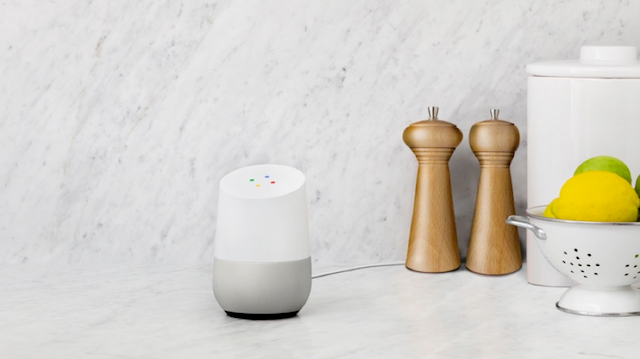Why Google Home and Assistant will kick Amazon and Apple to the curb

OPINION: Powered by the new conversational Google Assistant, Google Home promises to be the smart home hub we’ve all been waiting for – and takes the fight to rivals Apple and Amazon. Chris Smith looks at the plentiful possibilities…
Check out the promo video for the new Google Home device. On the surface, it’s pretty much a shot-for-shot remake of Amazon’s Echo introduction, right down to the supremely happy family whose life just got way, way better.
Google Home answers questions, checks the traffic, start playlists from the cloud, lights up when listening, controls smart home devices, reminds you of calendar appointments, offers far-field voice recognition, tracks shipments and generally acts like a new family member way more useful than the dog ever has been.
Strangely, Google’s vision of what “it might be like in the future” showcases stuff Amazon Echo and the Alexa assistant already does.
“Credit to the team at Amazon for creating a lot of excitement in this space,” Google CEO Sundar Pichai said, exhibiting the good grace so lacking whenever Apple’s Tim Cook takes one of his regular strolls down Imitation Avenue.
But surely making a video so similar to Amazon’s is a misstep that illustrates how Google is simply playing catch up? Well, not exactly.
Related: Everything announced at Google I/O 2016 that matters
Throughout the clip there’s subtle and not so subtle evidence of why Google Home is potentially a considerable leap forward over everything we’ve seen in this space so far and it’s all thanks to Google Assistant.
I’ve used Siri and Amazon’s Alexa extensively and there’s one thing that continually keeps me safe in the knowledge neither are sentient. It’s that inability to truly communicate – for requests to have context, to be sequential, and seem conversational. Thanks to Google Assistant, the bot-based offering that’ll feature across the company’s platforms, that oft-promised sci-fi future is on the horizon.
While built-in Google Cast, enabling easy multi-room audio and the ability to send video content to the television, is a no-brainer, the way it could be used washed over me like a tidal wave.
“How many stars are in the galaxy?” the kid asks. “Which one is closest? Show me what it looks like on the TV.”
Wait! Google Assistant knows what IT is? That’s huge.

With Alexa and Siri, that context just doesn’t exist. Frustratingly, every utterance has to be a new question with all of the variables filled in. They just don’t cater for those natural follow-on queries.
Thanks to the power of Google Search and its natural language smarts, Google Assistant enables you to ask: “What is Draymond Green’s jersey number?” and follow it up with “Where did he go to college?”
HE!
I tried this with the others. Siri can handle the first part, but the second just brings up the Wikipedia page for “college.”
Alexa, which doesn’t have access to Google Search and actually offers a really sucky search experience “doesn’t understand” either question.
So far, it’s been easy to excuse these shortcomings because the Echo proves it’s worth in other ways, but this was an epiphany. It’s how I want this kind of personal assistant to work.
Indeed, from a philosophical standpoint, Google Assistant has found the answer, whereas Amazon Alexa doesn’t know the question.
On the evidence of the admittedly aspirational video, it also seems like our existing relationships with Google, beyond search, will also allow Google Assistant to know us better than Alexa does.
With access to Gmail, your travel itineraries (and any delays) can be announced to you through a morning briefing when you tell it you’re listening. You’ll also be able to keep track of shipments beyond stuff you’ve bought from Amazon.
Integration with Google Calendar can theoretically make it possible to alter reservations (although we’re sceptical about the ability to instantly confirm a changed restaurant reservation that early in the morning, as depicted in the video).
Integration with connected messaging services will, again in theory, make it easy to let friends know of those changes in plans. Again, sequentially. And again, it can be done without constantly having to provide that context.
However, it’s not all so cut and dried. How much of this information you’ll want to share with Google is a different matter altogether.
While in many ways we’ve been wooed by the promise of what a personal assistant can be here, there are many ways in which the existing Echo device can still win this battle to control the home.
The third-party API already offers the ability to book an Uber, order Domino’s pizza, check your Fitbit stats. Google isn’t offering an API for Assistant yet, but says it plans to share more information later in the year. That step will be key.

Google is also promising integration with a few smart home providers, like its own Nest platform. Alexa already offers integration with a wide-range of smart home tech, either natively or through IFTTT recipes. Again, Amazon’s head start is considerable.
Google also promises Home will have “strong bass and clear highs,” making it a more capable much player, but at this stage we really don’t know whether the audio quality will be any better than the Echo.
However, at least Amazon vs Google seems like a fair fight right now. If Apple has any designs on taking over the living room through Siri and Homekit, there’s a lot of work to do. Based on what we say at I/O 2016, Cupertino is miles off the pace.
If Google is able to fully realise this lofty vision for Assistant, by having “billions of conversations [with] billions of people around the world,” that pace will be awfully difficult for its rivals to live with.
WATCH NOW: Google I/O 2016 Highlights
Is Google Home the game changer we’ve all been waiting for? Let us know in the comments below.


